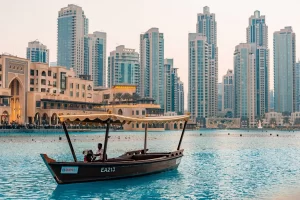Thinking of moving to a country with no income tax? You’re not alone – no one enjoys paying a large percentage of their wage in income tax, especially when you have no control over how and where it’s spent.
While a good accountant can minimize the amount of tax you pay, if your country has income tax to pay, you’ll be paying it. In countries like the UK, Germany, and Denmark, that can be up to 45%. That’s a tough pill to swallow.
However, there is a way that many (particularly high earners, who are literally taxed for their high achievement) choose to reduce their tax burden – relocate. By no means do all countries charge their residents income tax. Being domiciled in a state that doesn’t charge income tax can mean that more of your salary is under your control.
What countries have no income tax?
There are currently 23 countries in the world that don’t require residents to pay income tax. If you have decided that relocation is the best next step for you, you will need to choose which of these states is most suitable – not just for financial reasons but also where you would like to live.
It is more difficult to obtain a residence permit in some countries than others, and some have their own particular difficulties – some countries that have no income tax can be dangerous and some have extremely strict rules around who can and can’t live there, so you’ll need to consider what quality of life you want.
Here’s a list of the countries you should avoid due to crime or a failing economy, take too long to gain permanent residency in, or are simply too difficult to move to:
- Bahrain
- British Virgin Islands
- Brunei
- Kuwait
- Maldives
- Nauru
- Norfolk Island
- Pitcairn
- Oman
- Qatar
- Saint Barthelemy
- Saint Kitts and Nevis
- Somalia
- Turks and Caicos Islands
- Vatican City
- Wallis and Futuna
- Western Sahara
6 Most Popular Countries Without Income Tax
The Bahamas
The income of the Bahamas is largely derived from tourism and financial services. Obtaining citizenship is straightforward if you have the time and cash available, but the good news is you don’t have to become a citizen to benefit from an income tax-free life.
To qualify, you’ll need to live there for 90 days and not spend more than 183 days in another country. For permanent residency, you’ll need to purchase a (fully constructed) residence – those spending more than $750,000 BSD will get “speedy consideration,” though there are other ways, too.
The Bahamas enjoys a lower cost of living, good infrastructure, and a good range of services. Most people living in the Bahamas choose to go to their home country or to the US for medical treatment.
Bermuda
Bermuda is a more popular choice than the Bahamas since it’s more developed and enjoys significantly lower crime rates, but that does, of course, come at a cost. Bermuda has a high cost of living, largely due to its isolation. However, if you see yourself in the Caribbean, Bermuda will offer you beautiful beaches, fine dining, and exquisite scenery to explore.
Note that there is a payroll tax, which is about 6%. However, income from investments and even rental income is not taxed.
Cayman Islands
Tourism replaces oil as the mainstay of the Cayman Islands economy, enabling it to leave its inhabitants free of income tax. Aside from the beautiful climate, the standard of living is one of the highest in the world, making the Cayman Islands a popular choice for many seeking a tax-free life.
The Cayman Islands have no corporation tax, income tax, property tax, capital gains tax, payroll tax, or anything else – it’s a true tax haven.
Becoming a citizen is not hard, though you do need to have resided there for a minimum of 8 years. You are also required to have an annual income of at least $145,000 and an investment of $600,000 in real estate. There is an application charge and an income-based annual fee of up to $15,000.
Monaco
The Principality of Monaco has long been a financial center and, unsurprisingly, its residents enjoy a high standard of living. With beautiful scenery, the Monaco Grand Prix, and easy access to popular European countries, it’s easy to see why it has become so popular.
However, becoming a Monaco resident is costly, but it is fast. You can gain a legal residence permit by depositing more than 500,000 euros in a local bank, and owning or renting a home there. You should also be aware that companies that obtain over 25% of their profits outside Monaco (which is a small, city-state) face a 33% tax levy.
United Arab Emirates
Although the wealth of the UAE originally derived from oil and natural gas, it has successfully diversified its economy with the service sector and industry contributing half of the UAE’s GDP. Residents enjoy a high standard of living and the UAE is largely welcoming to foreign nationals.
Via the Kafala sponsorship program, individuals can receive sponsorship from a local business or resident and receive a visa, though this needs to be renewed regularly. Generally speaking, it is easier to gain residency in the UAE than in other Gulf countries.
The UAE offers plenty of luxury experiences, entertainment, and many people speak English, especially in cities like Dubai.
You can get a 10-year UAE residence visa if you’re an investor, willing to make a public investment of at least AED10 million. This can be to a local investment fund, forming a business in the UAE with capital of AED10 million, or a total of at least AED10 million across both options. The only condition is that you cannot invest more than 40% in real estate, the remainder must be elsewhere.
Vanuatu
Set in the South Pacific, Vanuatu is a country reliant on tourism and financial services for its income, though this is bolstered by agriculture. Gaining citizenship is relatively easy – around $145,000 for an individual and $195,000 for a family of four.
Vanuatu is a beautiful island near Fiji. It’s a good choice if you do most of your business in Australia, New Zealand, and South East Asia, but flights back and forth from Europe and the US will get old fast – it takes about 17.5 hours to fly from New York.
Why Choose the UAE?
If you read through the above list, the UAE is the one that ticks the most boxes – a strong, diverse economy, a high standard of living, a straightforward application process, and no income tax. It is also a safe and tolerant country that openly welcomes foreign residents, and is in a central location. While the visas have a maximum of 10 years, they can be renewed.
But what about corporate tax?
If you are an entrepreneur, is the UAE a good fit for businesses? The short answer is – yes. Although the UAE announced recently that it was introducing a 9% corporate tax for Mainland companies beginning in June 2023, it is still one of the best countries in which to found a company. Companies in Free Zones remain exempt from taxation.
As the world becomes less dependent on fossil fuels, so the governments of oil and natural gas-rich countries need to build for the future by diversification and a cautious introduction of taxation. Back in 2016, the Gulf Cooperation Council (GCC) decided that all states should impose VAT. The UAE, along with Saudi Arabia, was the first to do so, in 2018. Although the UAE set this at just 5%, it has generated an estimated $26 billion up to now.
Similarly, in 2021, the UAE, along with over 100 other countries, agreed to put in place a corporate tax of at least 15%. This was an effort to ensure that the global big corporate players pay their share of tax and help bolster the global economy. The UAE agreed as they see corporate tax as an aid to enlarge the country’s income streams but believe their move to a 9% tax will help them keep their competitive edge. By comparison, other countries that use low taxation as a means to boost investment set the charges rather higher. Singapore, for example, levies a 17% tax.
The UAE’s 9% is also the lowest among the six nations that make up the GCC (though Bahrain has not yet introduced a corporate tax). The move should improve corporate governance and help provide a boost to the broad economic outlook.
Moreover, the tax is only for profits above Dh375,000 (just over $100,000) dollars, so there will be little effect on nascent companies. It also doesn’t apply to profit generated from real estate – the government obviously sees this as an important sector going forward.
Individuals still enjoy a tax-free income
The new corporate tax has no direct impact on the individual – there will still be no income tax – though it may cause businesses to change the employment packages they offer if they wish to maintain the dividends offered to shareholders.
We are the experts
If you aren’t sure if the UAE is the country for you, reach out to us at Alexander Erber. Global Success Consulting was created by Alexander Erber to help high-flying clients maximize their asset protection and minimize their tax liabilities.
We understand the UAE, reside in the UAE, and are advocates for the country as a financial haven. We can help you move your assets to the UAE and make the most of its considerable benefits. Dubai is one of the best cities in the world in which to live and do business. Let us help you enjoy a tax-free life and build yourself a better, more profitable, and faster-growing company.


























